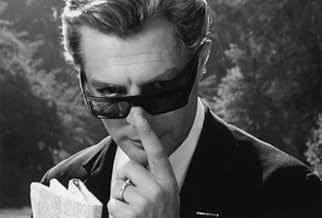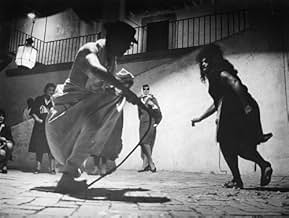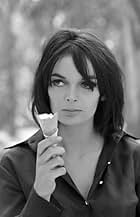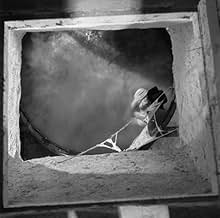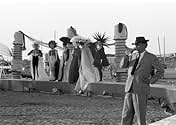8½
- 1963
- Tous publics
- 2h 18min
Un cinéaste dépressif fuit le monde du cinéma et se réfugie dans un univers peuplé de fantasmes.Un cinéaste dépressif fuit le monde du cinéma et se réfugie dans un univers peuplé de fantasmes.Un cinéaste dépressif fuit le monde du cinéma et se réfugie dans un univers peuplé de fantasmes.
- Réalisation
- Scénario
- Casting principal
- Récompensé par 2 Oscars
- 19 victoires et 9 nominations au total
Anouk Aimée
- Luisa Anselmi
- (as Anouk Aimee)
Eddra Gale
- La Saraghina
- (as Edra Gale)
Avis à la une
I certainly wouldn't be saying anything new if I said that "8 1/2" is one of the most unique, fascinating, and personal pieces ever committed to film. It has consistently hailed as such, and its influence on film is far reaching and undeniable. It is certainly not one of the most entertaining movies of all time, and is actually quite long and difficult. But it is an incredible piece of filmmaking, and a gripping look at the difficulties of creating not just a movie, but art in general.
Guido (Marcello Mastroianni) is a popular movie director who is working on his new film. Along the way, he struggles with his screenwriter, producer, wife, and mistress. Each presents a different problem and obstacle. More and more difficulties arise, not just in his attempts to complete the movie, but in his own mind.
Guido, although flawed, is completely fleshed out, and draws sympathy from the audience. Yes, he is an adulterer, but he loves his wife. We see all of his personal desires and agony. We see how he suffers when he struggles with his desire to create the ultimate piece of art, one that offers something to everybody.
The movie is technically wonderful. The movement of the camera, the lighting, and the direction in general is top notch. The movie mixes in dreams with reality to create a dreamlike world, and put us closer into Guido's own mind.
Somebody who is looking for a movie as a two hour piece of entertainment will not enjoy this. But if you enjoy a movie that truly satisfies when it is finished, this is for you. It is quite long, and somewhat loose, but that is part of the interest. Moviemakers, or artists in general, will find that this film has a great deal to offer.
Guido (Marcello Mastroianni) is a popular movie director who is working on his new film. Along the way, he struggles with his screenwriter, producer, wife, and mistress. Each presents a different problem and obstacle. More and more difficulties arise, not just in his attempts to complete the movie, but in his own mind.
Guido, although flawed, is completely fleshed out, and draws sympathy from the audience. Yes, he is an adulterer, but he loves his wife. We see all of his personal desires and agony. We see how he suffers when he struggles with his desire to create the ultimate piece of art, one that offers something to everybody.
The movie is technically wonderful. The movement of the camera, the lighting, and the direction in general is top notch. The movie mixes in dreams with reality to create a dreamlike world, and put us closer into Guido's own mind.
Somebody who is looking for a movie as a two hour piece of entertainment will not enjoy this. But if you enjoy a movie that truly satisfies when it is finished, this is for you. It is quite long, and somewhat loose, but that is part of the interest. Moviemakers, or artists in general, will find that this film has a great deal to offer.
Fellini's 8 1/2 opens with a stunning dream sequence in which a man is trapped in his car in the middle of a traffic jam. The doors and windows are locked and there is no escape. Other drivers simply sit and stare at him passively. The driver starts to panic as smoke begins to build up within the car. Propelling himself outside a window, he floats over the other cars and soars above the world until he is pulled down a rope attached to a tether on his ankle. The driver is Guido Anselmi (Marcello Mastroianni), a film director at odds with himself. Shot in black and white, 8 1/2 is an exhilarating, confusing, irritating, and inspired journey into a man's consciousness. It is not just a look at the inner turmoil of one person, but also a commentary on each person's struggle to make sense of their life. The film's combination of kaleidoscopic images, evocative score by Nino Rota, and amazing performances ensure its place as one of the greatest films of the century.
Guido is preparing to shoot a new film with an expensive budget. He constructs a huge spaceship launch pad that costs $80 million but he is unsure of what he wants to say. Guido's dishonesty in dealing with his marriage, his career, and the fact that he really does not want to make the film forces him to falsely mislead people as to his true intentions. He feels like a failure and is physically spent. He checks into a spa to restore his health and well being but the contingent of producers, actors, writers, and hangers on undermine his strength. His feeling of being overwhelmed by personal and professional obligations provides the catalyst for dreams and fantasies that take him back to his childhood.
Fellini shows his encounter with the prostitute Saraghina (Eddra Gale) and the guilt he has to deal with in a confrontation with the Catholic Church. Guido invites his intellectual wife Luisa (Anouk Aimée) to the set but their relationship has turned cold and passionless, and sparks fly when she has to confront Carla (Sandra Milo), his buxom mistress. Guido is misguided but he has an innocence and charm that allows us to overlook his indulgences. He enjoys his pleasures but has a conscience and feels guilty about cheating on Luisa whom he loves and is afraid of losing. He fantasizes that all of the women in his life are together in a harem where they all dote on his every whim. When they finally recognize how little he cares about them, he is forced to suppress their revolt.
As image piles on image and the fantasy becomes indistinguishable from the reality, the viewer may get lost in a maze of dazzling incoherence. Fellini, however, always returns to solid ground and the film offers not only a satire on the frenzy, the uncertainty, and the clash of egos involved with making a film but also a serious commentary on the importance of honesty in a relationship. If 8 1/2 is occasionally exhausting, the ending is invigorating, letting us know that life is a game in which each of us is on the stage performing our roles and the only sane response to its turmoil is to join hands in love and celebrate the moment.
Guido is preparing to shoot a new film with an expensive budget. He constructs a huge spaceship launch pad that costs $80 million but he is unsure of what he wants to say. Guido's dishonesty in dealing with his marriage, his career, and the fact that he really does not want to make the film forces him to falsely mislead people as to his true intentions. He feels like a failure and is physically spent. He checks into a spa to restore his health and well being but the contingent of producers, actors, writers, and hangers on undermine his strength. His feeling of being overwhelmed by personal and professional obligations provides the catalyst for dreams and fantasies that take him back to his childhood.
Fellini shows his encounter with the prostitute Saraghina (Eddra Gale) and the guilt he has to deal with in a confrontation with the Catholic Church. Guido invites his intellectual wife Luisa (Anouk Aimée) to the set but their relationship has turned cold and passionless, and sparks fly when she has to confront Carla (Sandra Milo), his buxom mistress. Guido is misguided but he has an innocence and charm that allows us to overlook his indulgences. He enjoys his pleasures but has a conscience and feels guilty about cheating on Luisa whom he loves and is afraid of losing. He fantasizes that all of the women in his life are together in a harem where they all dote on his every whim. When they finally recognize how little he cares about them, he is forced to suppress their revolt.
As image piles on image and the fantasy becomes indistinguishable from the reality, the viewer may get lost in a maze of dazzling incoherence. Fellini, however, always returns to solid ground and the film offers not only a satire on the frenzy, the uncertainty, and the clash of egos involved with making a film but also a serious commentary on the importance of honesty in a relationship. If 8 1/2 is occasionally exhausting, the ending is invigorating, letting us know that life is a game in which each of us is on the stage performing our roles and the only sane response to its turmoil is to join hands in love and celebrate the moment.
After 8 or 9 unsuccessful attempts in the past, at long last I somehow managed to sit through & stay awake for the entirety of this unfathomable bore but at what personal cost. A towering feat of cinematic boredom that arguably has no equals, this avant-garde surrealist comedy-drama turned out to be exactly what I presumed it would be: too far up its own ass.
Co-written & directed by Federico Fellini, the story of 8½ concerns a famous filmmaker who no longer remembers the film he wanted to make. The idea came from Fellini's own creative block during production and through all the pain that he underwent, he decided to make a story that captures the similar frustrations so that the audience can suffer just as much as he did.
On a serious note though, the film does acquaint the viewers to an extent with the struggles of creating art and the personal sacrifices that the process demands. It's an exhibition of what a director's job actually looks like and how regardless of his professional & personal issues, he's expected to deliver. It is aimless & convoluted like the film within the film coz it is the film within the film.
Overall, 8½ is a tedious, overlong & self-indulgent exercise that left me indifferent to everything it had in store and while I see the brilliance of its metafictional construction, the drama remains an insufferable eyesore filled with characters as bland & uninteresting as they can get. And the dream sequences are even worse. In short, this film is nothing more than a mere tick mark on a checklist for me.
Co-written & directed by Federico Fellini, the story of 8½ concerns a famous filmmaker who no longer remembers the film he wanted to make. The idea came from Fellini's own creative block during production and through all the pain that he underwent, he decided to make a story that captures the similar frustrations so that the audience can suffer just as much as he did.
On a serious note though, the film does acquaint the viewers to an extent with the struggles of creating art and the personal sacrifices that the process demands. It's an exhibition of what a director's job actually looks like and how regardless of his professional & personal issues, he's expected to deliver. It is aimless & convoluted like the film within the film coz it is the film within the film.
Overall, 8½ is a tedious, overlong & self-indulgent exercise that left me indifferent to everything it had in store and while I see the brilliance of its metafictional construction, the drama remains an insufferable eyesore filled with characters as bland & uninteresting as they can get. And the dream sequences are even worse. In short, this film is nothing more than a mere tick mark on a checklist for me.
Intellectuals have written volumes on this strange film by Italian New Wave director, Federico Fellini. I am not an intellectual, so my review will be brief. At its most basic, "8 1/2" (a.k.a. "Otto e mezzo") concerns Guido, a film director (supposedly a surrogate for Fellini himself), who is having what amounts to a midlife crisis. Guido is frustrated in his film-making, and by his relations with other people in his life. But the film's story does not proceed in a traditional, linear fashion. Fellini more or less abandons logical narration, in favor of "open form" narration, wherein the story's causal chain of events is broken.
Thus, trying to figure out what is going on in this film can be hard. Guido's fantasies, memories, dreams, and reality co-mingle in a kind of cinematic stew. Fellini presents viewers with a kaleidoscope of surreal B&W images of ordinary objects and eccentric, chattering characters which interact with Guido and with each other, in ways that defy logic, and give breathtaking meaning to the term symbolism. Followers of psychologist Carl Jung would have a field day. In style, the film is flamboyant. In substance, the film is maddeningly subliminal. And yet, even the most metallic cynic, Pauline Kael notwithstanding, must surely appreciate the rareness of Fellini's probing introspection.
Given the bizarre, unstructured content of "8 1/2", I wonder about the issue of necessity. Suppose Fellini had added an extra ten minutes to the screenplay, or deleted ten minutes. Would that have made any difference? Apart from Guido, if this or that character had been deleted, how would that have changed the story's significance? And if, as some have suggested, the film is a mirror image of Fellini's own confused psyche, can the story be construed as an intuition of his future film-making?
"Otto e mezzo" is not for everyone. Like a Zen koan, "8 1/2" invites frustration. It is above all else a celebration of ambiguity and abstraction, a cinematic experience to ponder, especially on the heels of four or five martinis ... or 8 1/2, if you really want to induce immense intellectual insight. Cheers.
Thus, trying to figure out what is going on in this film can be hard. Guido's fantasies, memories, dreams, and reality co-mingle in a kind of cinematic stew. Fellini presents viewers with a kaleidoscope of surreal B&W images of ordinary objects and eccentric, chattering characters which interact with Guido and with each other, in ways that defy logic, and give breathtaking meaning to the term symbolism. Followers of psychologist Carl Jung would have a field day. In style, the film is flamboyant. In substance, the film is maddeningly subliminal. And yet, even the most metallic cynic, Pauline Kael notwithstanding, must surely appreciate the rareness of Fellini's probing introspection.
Given the bizarre, unstructured content of "8 1/2", I wonder about the issue of necessity. Suppose Fellini had added an extra ten minutes to the screenplay, or deleted ten minutes. Would that have made any difference? Apart from Guido, if this or that character had been deleted, how would that have changed the story's significance? And if, as some have suggested, the film is a mirror image of Fellini's own confused psyche, can the story be construed as an intuition of his future film-making?
"Otto e mezzo" is not for everyone. Like a Zen koan, "8 1/2" invites frustration. It is above all else a celebration of ambiguity and abstraction, a cinematic experience to ponder, especially on the heels of four or five martinis ... or 8 1/2, if you really want to induce immense intellectual insight. Cheers.
Frederico Fellini's masterwork 8 ½ is difficult to approach largely because of its reputation. Many critics also state that the film is so complex that it requires multiple viewings to understand, and this is likely to intimidate many viewers. But in truth, and in spite of its surrealistic flourishes, 8 ½ is more straight-forward than its reputation might lead you to believe.
The storyline itself is very simple. A famous director is preparing a new film, but finds himself suffering from creative block: he is obsessed by, loves, and feels unending frustration with both art and women, and his attention and ambition flies in so many different directions that he is suddenly incapable of focusing on one possibility lest he negate all others. With deadlines approaching the cast and crew descend upon him demanding information about the film--information that the director does not have because he finds himself incapable of making an artistic choice.
What makes the film interesting is the way in which Fellini ultimately transforms the film as a whole into a commentary on the nature of creativity, art, mid-life crisis, and the battle of the sexes. Throughout the film, the director dreams dreams, has fantasies, and recalls his childhood--and this internal life is presented on the screen with the same sense of reality as reality itself. The staging of the various shots is unique; one is seldom aware that the characters have slipped into a dream, fantasy, or memory until one is well into the scene, and as the film progresses the lines between external life and internal thought become increasingly blurred, with Fellini giving as much (if not more) importance to fantasy as to fact.
The performances and the cinematography are key to the film's success. Even when the film becomes surrealistic, fantastic, the actors perform very realistically and the cinematography presents the scene in keeping with what we understand to be the reality of the characters lives and relationships. At the same time, however, the film has a remarkably poetic quality, a visual fluidity and beauty that transforms even the most ordinary events into something slightly tinged by a dream-like quality. Marcello Mastroianni offers a his greatest performance here, a delicate mixture of desperation and ennui, and he is exceptionally well supported by a cast that includes Claudia Cardinale, Anouk Aimee, and a host of other notables.
I would encourage people not to be intimidated by the film's reputation, for its content can be quickly grasped. When critics state the film requires repeated viewing what they actually seem to mean is that the film holds up extremely well to repeated viewing; each time it is seen, one finds more and more to enjoy and to contemplate. Even so, I would be amiss if I did not point out that people who prefer a cinema of tidy plot lines and who dislike ambiguity or the necessity of interpreting content will probably dislike 8 ½ a great deal. For all others: strongly, strongly recommended.
Gary F. Taylor, aka GFT, Amazon Reviewer
The storyline itself is very simple. A famous director is preparing a new film, but finds himself suffering from creative block: he is obsessed by, loves, and feels unending frustration with both art and women, and his attention and ambition flies in so many different directions that he is suddenly incapable of focusing on one possibility lest he negate all others. With deadlines approaching the cast and crew descend upon him demanding information about the film--information that the director does not have because he finds himself incapable of making an artistic choice.
What makes the film interesting is the way in which Fellini ultimately transforms the film as a whole into a commentary on the nature of creativity, art, mid-life crisis, and the battle of the sexes. Throughout the film, the director dreams dreams, has fantasies, and recalls his childhood--and this internal life is presented on the screen with the same sense of reality as reality itself. The staging of the various shots is unique; one is seldom aware that the characters have slipped into a dream, fantasy, or memory until one is well into the scene, and as the film progresses the lines between external life and internal thought become increasingly blurred, with Fellini giving as much (if not more) importance to fantasy as to fact.
The performances and the cinematography are key to the film's success. Even when the film becomes surrealistic, fantastic, the actors perform very realistically and the cinematography presents the scene in keeping with what we understand to be the reality of the characters lives and relationships. At the same time, however, the film has a remarkably poetic quality, a visual fluidity and beauty that transforms even the most ordinary events into something slightly tinged by a dream-like quality. Marcello Mastroianni offers a his greatest performance here, a delicate mixture of desperation and ennui, and he is exceptionally well supported by a cast that includes Claudia Cardinale, Anouk Aimee, and a host of other notables.
I would encourage people not to be intimidated by the film's reputation, for its content can be quickly grasped. When critics state the film requires repeated viewing what they actually seem to mean is that the film holds up extremely well to repeated viewing; each time it is seen, one finds more and more to enjoy and to contemplate. Even so, I would be amiss if I did not point out that people who prefer a cinema of tidy plot lines and who dislike ambiguity or the necessity of interpreting content will probably dislike 8 ½ a great deal. For all others: strongly, strongly recommended.
Gary F. Taylor, aka GFT, Amazon Reviewer
Le saviez-vous
- Anecdotes8½ (1963) was shot, like almost all Italian movies at the time, completely without sound recording on set. All dialogue was dubbed during post production. Federico Fellini was known for shouting direction at his actors during shooting, and for rewriting dialogue afterwards, making a lot of the dialogue in the movie appear out-of-sync. (Source: High-def Digest)
- GaffesWhen Guido visits the cardinal in the mud bath, the cardinal is sitting in a chair, fully dressed in his cassock, as two attendants use a sheet to form a curtain around him; however, as the camera cuts to a closer angle, the cardinal is suddenly undressed to the waist.
- Citations
Claudia: I don't understand. He meets a girl that can give him a new life and he pushes her away?
Guido: Because he no longer believes in it.
Claudia: Because he doesn't know how to love.
Guido: Because it isn't true that a woman can change a man.
Claudia: Because he doesn't know how to love.
Guido: And above all because I don't feel like telling another pile of lies.
Claudia: Because he doesn't know how to love.
- Versions alternativesIn the American theatrical release version, Rodgers & Hart's "Blue Moon" can be heard twice: the first time, when it's played by strolling strings near the shopping plaza where Guido meets up with his wife, Luisa; the second time, when Guido goes out for a drive with the "real" Claudia. However, in the original Italian release, the song played in both scenes is "Sheik of Araby." The Criterion laserdisc features "Blue Moon," but it's "Sheik of Araby" on the DVD, possibly due to the use of different source materials.
- ConnexionsEdited into Bellissimo: Immagini del cinema italiano (1985)
Meilleurs choix
Connectez-vous pour évaluer et suivre la liste de favoris afin de recevoir des recommandations personnalisées
Détails
- Date de sortie
- Pays d’origine
- Sites officiels
- Langues
- Aussi connu sous le nom de
- Huit et demi
- Lieux de tournage
- Tivoli, Rome, Lazio, Italie(location)
- Sociétés de production
- Voir plus de crédits d'entreprise sur IMDbPro
Box-office
- Montant brut aux États-Unis et au Canada
- 245 681 $US
- Week-end de sortie aux États-Unis et au Canada
- 11 947 $US
- 11 avr. 1999
- Montant brut mondial
- 347 423 $US
- Durée2 heures 18 minutes
- Couleur
- Mixage
- Rapport de forme
- 1.85 : 1
Contribuer à cette page
Suggérer une modification ou ajouter du contenu manquant





